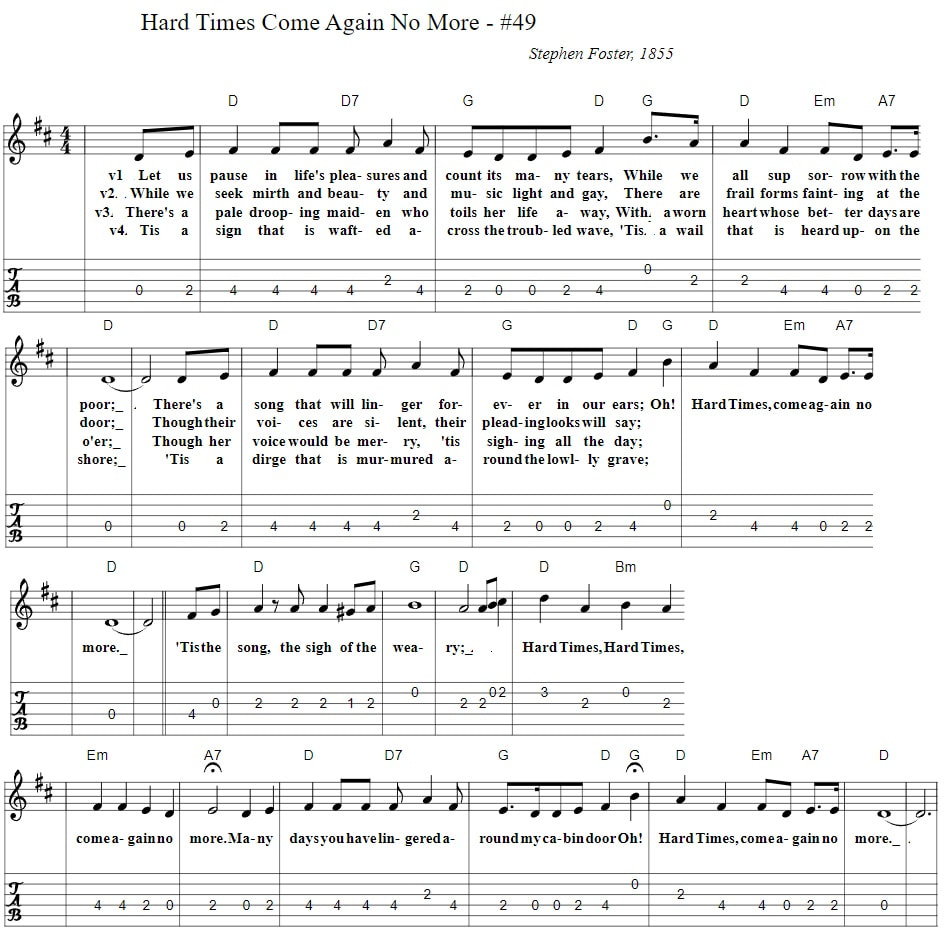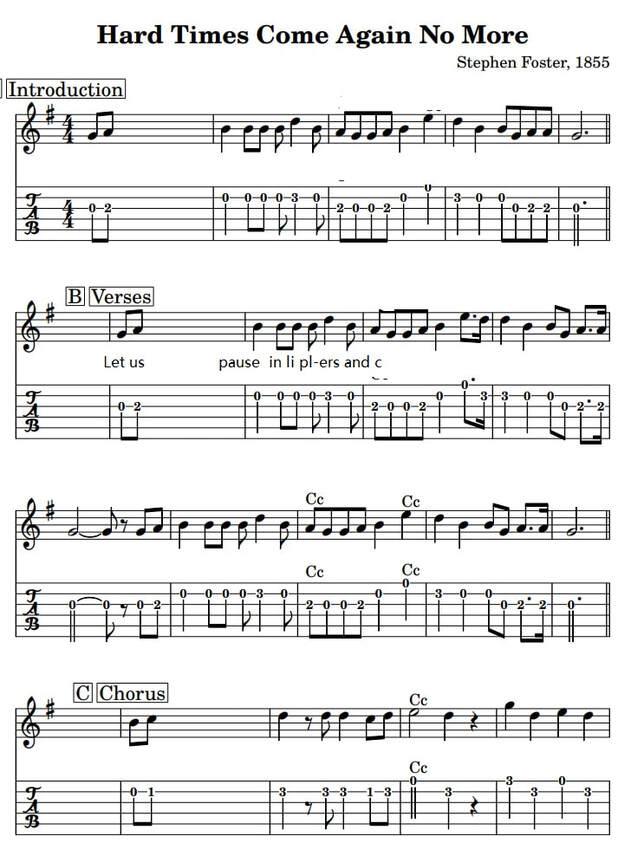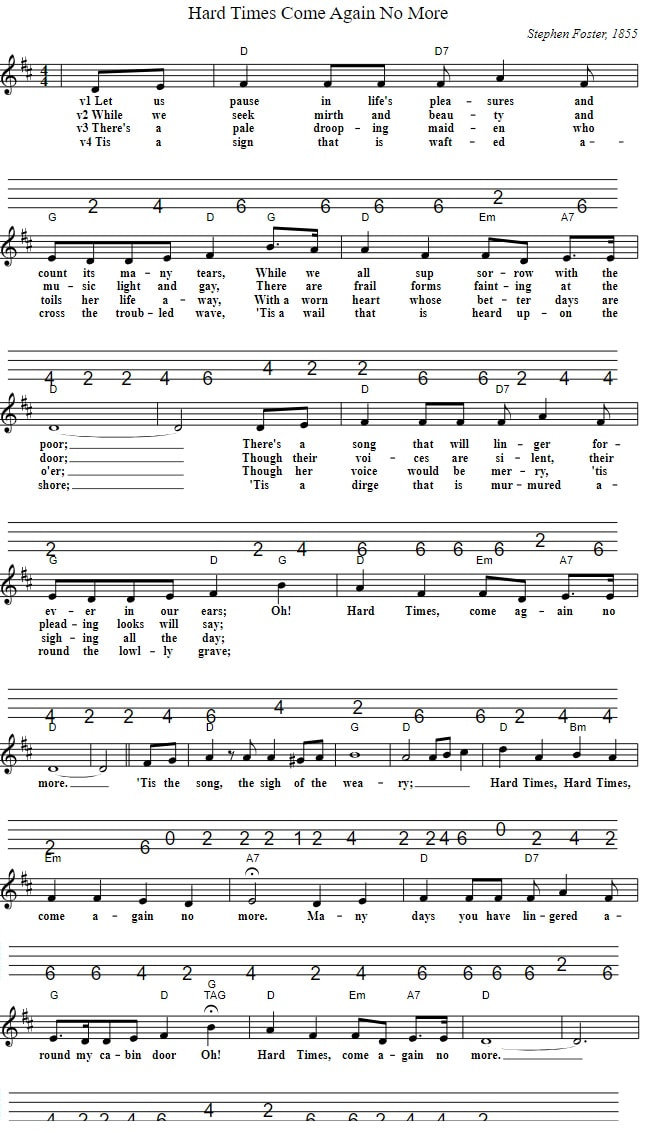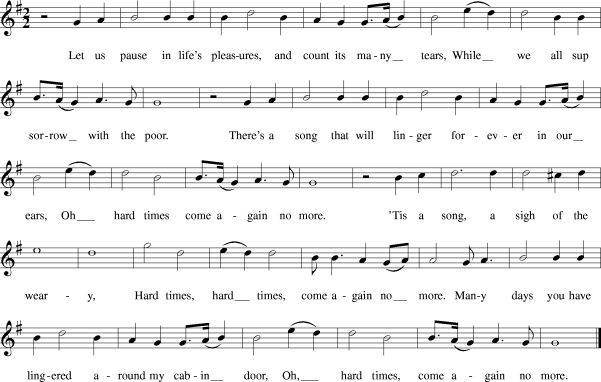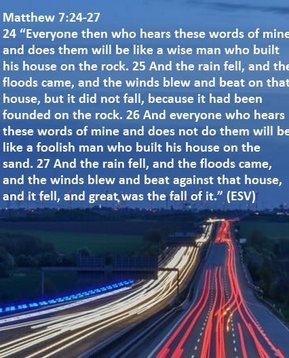Hard Times Come Again No More lyrics and chords
Hard times come again no more guitar tab now added. Written by Stephen Foster.Thanks goes to Donnacha Kavanagh for sending me this one, The sheet music notes are included. A big hit for Mary Black. Also recorded by Michael S. Togher, who's featured in the youtube video playing in up-tempo style, also singer Tommy Fleming and by The Chieftains . The guitar chords are in the key of C with a version also in G Major. There are many more Mary Black Songs here with the guitar chords. The most success from an Irish singer who covered this song is by Tommy Flemming who seems to sing it at all his sell out shows. A version of the tenor guitar / mandola tab is now added with tuning of CGDA.
Let us [C]pause in life's pleasures
And [F]count its many [C]tears
[F]While we [C]all sup [G]sorrow [G7]with the [C]poor
There's a [C]song that will linger
For[F]ever [G]in our [Am]ears;
[F]Oh, [C]hard times, [G]come a[G7]gain no [C]more
Chorus:
'Tis the [C]song, the sigh of the [F]wea[C]ry
[C]Hard times, [F]hard [C]times,
[D9]Come a[D7]gain no [G]more
[G7]Many [C]days you have [C7]ling[Gm]ered
[F]around my [G]cabin [Am]door
[F]Oh, [C]hard times, [G]come [G7]again no [C]more
While we [C]seek mirth and beauty
And [F]music light and [C]gay,
[F]There are [C]frail forms [G]fainting [G7]at the [C]door
Though their [C]voices are silent,
Their [F]pleading [G]looks will [Am]say
[F]Oh, [C]hard times, [G]come a[G7]gain no [C]more
Chorus
There's [C]pale drooping maiden
Who [F]toils her life [C]away,
[F]With a [C]worn heart, whose [G]better [G7]days are [C]o'er
Though her [C]voice would be merry,
'tis [F]sighing [G]all the [Am]day,
[F]Oh, [C]hard times, [G]come a[G7]gain no [C]more
Chorus
'Tis a [C]sigh that is wafted
A[F]cross the troubled [C]wave
[F]Tis a [C]wail that is [G]heard up[G7]on the [C]shore
Tis a [C]dirge that is murmured
A[F]round the [G]lowly [Am]grave
[F]Oh, [C]hard times, [G]come [G7]again no [C]more
Chorus
Ending:
'Tis the [C]song, the sigh of the [F]wea[C]ry
[C]Hard times, [F]hard [C]times,
[D9]Come a[D7]gain no [G]more
[G7]Many [C]days you have [C7]ling[Gm]ered
[F]around my [G]cabin [Am]door
[F]Oh, [C]hard times, [G]come [G7]again no [F]more [C]
And [F]count its many [C]tears
[F]While we [C]all sup [G]sorrow [G7]with the [C]poor
There's a [C]song that will linger
For[F]ever [G]in our [Am]ears;
[F]Oh, [C]hard times, [G]come a[G7]gain no [C]more
Chorus:
'Tis the [C]song, the sigh of the [F]wea[C]ry
[C]Hard times, [F]hard [C]times,
[D9]Come a[D7]gain no [G]more
[G7]Many [C]days you have [C7]ling[Gm]ered
[F]around my [G]cabin [Am]door
[F]Oh, [C]hard times, [G]come [G7]again no [C]more
While we [C]seek mirth and beauty
And [F]music light and [C]gay,
[F]There are [C]frail forms [G]fainting [G7]at the [C]door
Though their [C]voices are silent,
Their [F]pleading [G]looks will [Am]say
[F]Oh, [C]hard times, [G]come a[G7]gain no [C]more
Chorus
There's [C]pale drooping maiden
Who [F]toils her life [C]away,
[F]With a [C]worn heart, whose [G]better [G7]days are [C]o'er
Though her [C]voice would be merry,
'tis [F]sighing [G]all the [Am]day,
[F]Oh, [C]hard times, [G]come a[G7]gain no [C]more
Chorus
'Tis a [C]sigh that is wafted
A[F]cross the troubled [C]wave
[F]Tis a [C]wail that is [G]heard up[G7]on the [C]shore
Tis a [C]dirge that is murmured
A[F]round the [G]lowly [Am]grave
[F]Oh, [C]hard times, [G]come [G7]again no [C]more
Chorus
Ending:
'Tis the [C]song, the sigh of the [F]wea[C]ry
[C]Hard times, [F]hard [C]times,
[D9]Come a[D7]gain no [G]more
[G7]Many [C]days you have [C7]ling[Gm]ered
[F]around my [G]cabin [Am]door
[F]Oh, [C]hard times, [G]come [G7]again no [F]more [C]
The list of sheet music / tin whistle note songs below are from the PDF Ebook which you can buy for €7.50 . I'll email the download link after purchase.
Hard times come again no more guitar chords and tab
Below Is A version Of Hard times come again no more tenor guitar / mandola tab in CGDA Tuning
HARD TIMES COME AGAIN NO MORE 4/4 (Chieftains version)
Use a capo on the 2nd fret to play along with the Chieftains
Intro: G7-C-C-C C-G7-G-Am F-C-Am-G-G7-C –G-C. Chords worked out by Marc and are very easy to play.
Let us [C]pause in life's pleasures
And [G]count its [G7]many [Am]tears
[F]While we [C]all sup [G]sorrow [G7]with the [C]poor -G7-C
[C]There's a song that will linger
For[G]ever [G7]in our [Am]ears;
[F]Oh, [C]hard times, [G]come a[G7]gain no [C]more -G7-C
Chorus
'Tis the [C]song, the sigh of the [F]wea[C]ry
Hard times, [Am]hard [D]times,
[D9]Come a[D7]gain no [G]more -G7-Gsus4-G
[G]Many [C]days you have lingered
[G]around my [G7]cabin [Am]door
[F]Oh, [C]hard times, [G]come [G7]again no [C]more -G7-C
While we [C]seek mirth and beauty
And [G]music [G7]light and [Am]gay,
[F]There are [C]frail forms [G]fainting [G7]at the [C]door -G7-C
[C]Though their voices are silent,
Their [G]pleading [G7]looks will [Am]say
[F]Oh, [C]hard times, [G]come a[G7]gain no [C]more -G7-C
Chorus
Instrumental Bridge
C-Am-F-G7-C C-Am-D9-G-G7-G –G7-G
G7-C-C-C C-G7-G-Am F-C-Am-G-G7-C –G-C
There's [C]pale drooping maiden
Who [G]toils her [G7]life a[Am]way,
[F]With a [C]worn heart, whose [G]better [G7]days are [C]o'er -G7-C
[C]Though her voice would be merry,
'tis [G]sighing [G7]all the [Am]day,
[F]Oh, [C]hard times, [G]come a[G7]gain no [C]more -G7-C
'Tis a [C]sigh that is wafted
A[G]cross the [G7]troubled [Am]wave
[F]Tis a [C]wail that is [G]heard up[G7]on the [C]shore -G7-C
[C]Tis a dirge that is murmured
A[G]round the [G7]lowly [Am]grave
[F]Oh, [C]hard times, [G]come [G7]again no [C]more -G7-C
Chorus
[F]Oh, [C]hard times, [G]come [G7]again no [G]more [C]
Use a capo on the 2nd fret to play along with the Chieftains
Intro: G7-C-C-C C-G7-G-Am F-C-Am-G-G7-C –G-C. Chords worked out by Marc and are very easy to play.
Let us [C]pause in life's pleasures
And [G]count its [G7]many [Am]tears
[F]While we [C]all sup [G]sorrow [G7]with the [C]poor -G7-C
[C]There's a song that will linger
For[G]ever [G7]in our [Am]ears;
[F]Oh, [C]hard times, [G]come a[G7]gain no [C]more -G7-C
Chorus
'Tis the [C]song, the sigh of the [F]wea[C]ry
Hard times, [Am]hard [D]times,
[D9]Come a[D7]gain no [G]more -G7-Gsus4-G
[G]Many [C]days you have lingered
[G]around my [G7]cabin [Am]door
[F]Oh, [C]hard times, [G]come [G7]again no [C]more -G7-C
While we [C]seek mirth and beauty
And [G]music [G7]light and [Am]gay,
[F]There are [C]frail forms [G]fainting [G7]at the [C]door -G7-C
[C]Though their voices are silent,
Their [G]pleading [G7]looks will [Am]say
[F]Oh, [C]hard times, [G]come a[G7]gain no [C]more -G7-C
Chorus
Instrumental Bridge
C-Am-F-G7-C C-Am-D9-G-G7-G –G7-G
G7-C-C-C C-G7-G-Am F-C-Am-G-G7-C –G-C
There's [C]pale drooping maiden
Who [G]toils her [G7]life a[Am]way,
[F]With a [C]worn heart, whose [G]better [G7]days are [C]o'er -G7-C
[C]Though her voice would be merry,
'tis [G]sighing [G7]all the [Am]day,
[F]Oh, [C]hard times, [G]come a[G7]gain no [C]more -G7-C
'Tis a [C]sigh that is wafted
A[G]cross the [G7]troubled [Am]wave
[F]Tis a [C]wail that is [G]heard up[G7]on the [C]shore -G7-C
[C]Tis a dirge that is murmured
A[G]round the [G7]lowly [Am]grave
[F]Oh, [C]hard times, [G]come [G7]again no [C]more -G7-C
Chorus
[F]Oh, [C]hard times, [G]come [G7]again no [G]more [C]
Hard Times Sheet Music Key Of G Major
Hard Times Chords In Key Of G Major
Let us [G]pause in life's pleasures
And [C]count its many [G]tears
[C]While we [G]all sup [D]sorrow [D7]with the [G]poor
There's a [G]song that will linger
For[C]ever [D]in our [Em]ears;
[C]Oh, [G]hard times, [D]come a[D7]gain no [G]more
'Tis the [G]song, the sigh of the [C]wea[G]ry
[G]Hard times, [C]hard [G]times,
[A9]Come a[A7]gain no [D]more
[D7]Many [G]days you have [G7]ling[Dm]ered
[C]around my [D]cabin [Em]door
[C]Oh, [G]hard times, [D]come [D7]again no [G]more
While we [G]seek mirth and beauty
And [C]music light and [G]gay,
[C]There are [G]frail forms [D]fainting [D7]at the [G]door
Though their [G]voices are silent,
Their [C]pleading [D]looks will [Em]say
[C]Oh, [G]hard times, [D]come a[D7]gain no [G]more
There's [G]pale drooping maiden
Who [C]toils her life [G]away,
[C]With a [G]worn heart, whose [D]better [D7]days are [G]o'er
Though her [G]voice would be merry,
'tis [C]sighing [D]all the [Em]day,
[C]Oh, [G]hard times, [D]come a[D7]gain no [G]more
'Tis a [G]sigh that is wafted
A[C]cross the troubled [G]wave
[C]Tis a [G]wail that is [D]heard up[D7]on the [G]shore
Tis a [G]dirge that is murmured
A[C]round the [D]lowly [Em]grave
[C]Oh, [G]hard times, [D]come [D7]again no [G]more
'Tis the [G]song, the sigh of the [C]wea[G]ry
[G]Hard times, [C]hard [G]times,
[A9]Come a[A7]gain no [D]more
[D7]Many [G]days you have [G7]ling[Dm]ered
[C]around my [D]cabin [Em]door
[C]Oh, [G]hard times, [D]come [D7]again no [C]more [G]
And [C]count its many [G]tears
[C]While we [G]all sup [D]sorrow [D7]with the [G]poor
There's a [G]song that will linger
For[C]ever [D]in our [Em]ears;
[C]Oh, [G]hard times, [D]come a[D7]gain no [G]more
'Tis the [G]song, the sigh of the [C]wea[G]ry
[G]Hard times, [C]hard [G]times,
[A9]Come a[A7]gain no [D]more
[D7]Many [G]days you have [G7]ling[Dm]ered
[C]around my [D]cabin [Em]door
[C]Oh, [G]hard times, [D]come [D7]again no [G]more
While we [G]seek mirth and beauty
And [C]music light and [G]gay,
[C]There are [G]frail forms [D]fainting [D7]at the [G]door
Though their [G]voices are silent,
Their [C]pleading [D]looks will [Em]say
[C]Oh, [G]hard times, [D]come a[D7]gain no [G]more
There's [G]pale drooping maiden
Who [C]toils her life [G]away,
[C]With a [G]worn heart, whose [D]better [D7]days are [G]o'er
Though her [G]voice would be merry,
'tis [C]sighing [D]all the [Em]day,
[C]Oh, [G]hard times, [D]come a[D7]gain no [G]more
'Tis a [G]sigh that is wafted
A[C]cross the troubled [G]wave
[C]Tis a [G]wail that is [D]heard up[D7]on the [G]shore
Tis a [G]dirge that is murmured
A[C]round the [D]lowly [Em]grave
[C]Oh, [G]hard times, [D]come [D7]again no [G]more
'Tis the [G]song, the sigh of the [C]wea[G]ry
[G]Hard times, [C]hard [G]times,
[A9]Come a[A7]gain no [D]more
[D7]Many [G]days you have [G7]ling[Dm]ered
[C]around my [D]cabin [Em]door
[C]Oh, [G]hard times, [D]come [D7]again no [C]more [G]
